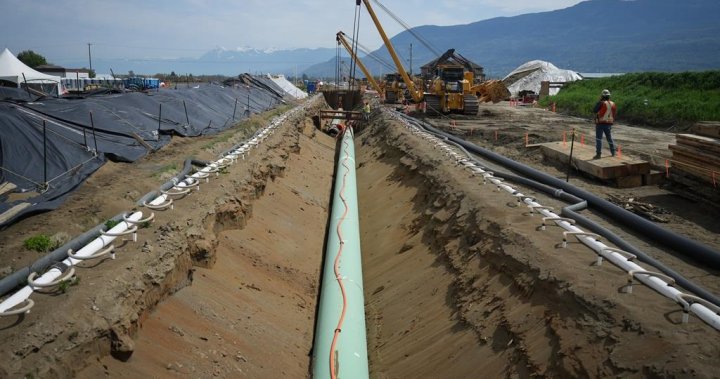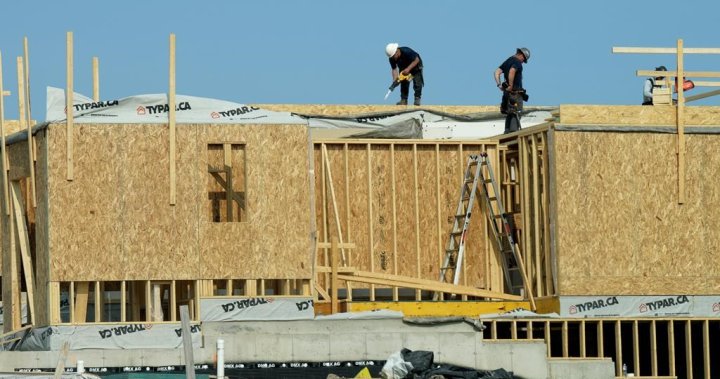A group of oil shippers is asking the Canada Energy Regulator to compel the company behind the Trans Mountain pipeline expansion to provide them with a full and detailed breakdown of the project’s escalating construction costs.
The shippers — which includes Canadian Natural Resources Ltd., Suncor Energy Inc.,, Cenovus Energy Inc., PetroChina Canada Ltd. and Marathon Petroleum Canada — are seeking an order from the regulator requiring Trans Mountain Corp. to provide more information about why the project’s costs have ballooned to more than $30 billion from a 2017 estimate of $7.4 billion.
“The stakes are high: billions of dollars at issue, with Trans Mountain’s (costs) having more than quintupled since 2017 — and its costs are still growing by billions, seemingly unchecked,” the oil companies stated in a motion filed with the Canada Energy Regulator earlier this week.
“Yet Trans Mountain refused to answer most of participating shippers’ (request for information) and inappropriately dismissed most requests as irrelevant ‘fishing expeditions.’”
The Trans Mountain pipeline, which was bought by the federal government in 2018, is Canada’s only oil pipeline to the West Coast.
Its nearly complete expansion project will increase the pipeline’s capacity by 590,000 barrels per day to a total of 890,000 barrels per day, improving access to export markets for Canadian oil companies.
But Trans Mountain Corp. and its oil company customers are currently engaged in a dispute over tolls, the term for the fees the pipeline company will charge to ship oil on the expanded pipeline.
Financial news and insights
delivered to your email every Saturday.
Financial news and insights
delivered to your email every Saturday.
In its most recent update provided last month, Trans Mountain said it now has reason to believe the costs of the project will come in approximately $3.1 billion higher than the $30.9 billion estimate in May 2023. It said a final tally won’t be available until after the project’s completion, expected sometime this spring.
Oil companies are concerned with the escalating costs because they will have to pay for a portion of them in the form of rising tolls.
While approximately 70 per cent of the project’s cost overruns will be borne by Trans Mountain, the remaining third — more than $9 billion — is considered “uncapped costs” which increase tolls in accordance with a formula agreed to by shippers and approved by the regulator more than a decade ago.
But the oil shippers say the new benchmark toll Trans Mountain wishes to charge is nearly twice the amount of a 2017 estimate, and say more information must be provided in order to prove the rising price tag of the project is both reasonable and necessary.
They say they have asked Trans Mountain to provide a more detailed breakdown, and are seeking an order from the regulator because they aren’t satisfied with the company’s response.
The Canada Energy Regulator has already granted approval for Trans Mountain to charge the higher toll on an interim basis, but is yet to make a final decision.
For its part, Trans Mountain Corp. — which is a Crown corporation — has said 70 per cent of the project’s cost overruns will be borne by the pipeline company and will have no effect on tolls.
The company has also previously stated that because of the project’s cost overruns, it expects only “modest returns” on its investment in the first few years of the expanded pipeline’s operation. It says that any toll level below what Trans Mountain has applied for “could impact Trans Mountain’s ability to meet its financial obligations.”
In December, Trans Mountain Corp. submitted written evidence to the regulator in which it said the pipeline expansion project has been affected by “extraordinary” factors that include evolving compliance requirements, Indigenous accommodations, stakeholder engagement and compensation requirements, extreme weather and the COVID-19 pandemic.
The company said in its filing that the project’s cost overruns were “reasonably and justifiably incurred.”
Construction on the Trans Mountain pipeline expansion project began in 2019.
© 2024 The Canadian Press




